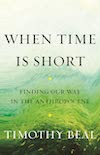Dominion theology—the idea that humans are created uniquely like God and given godlike rule over the rest of creation—is built on a very tiny bit of Bible, namely, a couple of verses in the first creation story in Genesis (1:1–2:4a) and a couple of more verses in one of the Psalms (8:5–6). Biblically inspired claims to exceptional godlike dominion ultimately come down to these few verses, which have gotten huge traction, especially in the modern West, in driving our immortality vehicle. They’re the biblical basis of our grand narrative of godlike dominion and human exceptionalism. They are therefore most in need of rereading in context. To do so, we’ll need to wade a little ways into some somewhat academic thickets related to Hebrew words and questions of translation.
First, what kind of creator is this God, and what kind of creative process is at work here? The dominionist interpretation imagines that this God is all-powerful and sovereign, and that he creates the world from nothing. This view, which goes back at least to the early Christian theologian and bishop Augustine of Hippo (d. 430 CE), is based on Latin and Greek translations of the Hebrew text.In those translations, the sense is that God first creates the heavens and the earth from nothing, and that the earth, which God created from nothing, was initially formless and void. Then God proceeds to develop the earth into habitable formfulness, separating water from land, populating it with plants and animals, and so on. God, transcending time and space, acts as first cause, unmoved mover, creating the heavens and earth out of nothing and then proceeding to arrange them into cosmic order.
The Hebrew text, however, conjures a very different image, not of creation from nothing but emergence from chaos. How could it be so different from the Greek and Latin translations? It comes down to the very first Hebrew word in the story, bere’šit (“be-ray-sheet”), and how we read its very first letter, the bet (“b” sound), in relation to the rest of the word, re’šit. This word can be taken either as a noun, “beginning,” or as a verb, “began.”
If you read it as a noun, as the Greek and Latin translations did, then you take the bet as a preposition, “in,” and you get a simple declarative sentence familiar from the King James Version translation: “In the beginning God created the heaven and the earth.” Full stop. What follows, “And the earth was without form, and void,” then describes the unformed, chaotic (tohu vabohu) earth that God just created from nothing. Taken this way, then, we imagine an absolute beginning, with God creating heaven and earth from nothing. Which is how the Greek and Latin translations took it.
But if you read this first word as a verb, as most Hebrew biblical scholars argue you should, then the bet modifies that verb, and you get something like “when began.” That leads to a translation something like, “When God began creating the heavens and the earth, the earth,” which was already there when God began creating, “was formless void.” Taken this way, we have a story that begins not at some absolute metaphysical beginning, with nothing, but in the midst of things, with God creating, or rather giving shape and form to, things that are already there in some sort of primordial formlessness.
This offers an image of God as a co-creative participant with the material universe, interacting with each element of creation as it emerges and integrates within a larger ecosystem. This is not creation from nothing but emergence from chaos, with a creator God who’s in relationship both with the material world and with the primordial deep from which it surfaces. God and matter are not categorically separate. On the contrary, they’re intimately connected.
Second, how are we to understand the value of the nonhuman in relation to the human in this story? Is it, as the dominionist interpretation argues, a matter of use value? Are animals and the rest of creation there for humankind to use, a bounteous gift of “natural resources”? The fact that, after each stage of creation, God declares that it is all “good,” in and of itself, without reference to humans, already suggests otherwise. Not once does God say “The humans are going to love this! I can’t wait to see what they do with it.”
Indeed, God also blesses other living creatures before humankind is even created. Concerning the sea creatures and birds, “God blessed them, saying, “Be fruitful and multiply and fill the waters in the seas, and birds will multiply in the earth” (1:22). Later, after God creates humans, God addresses all human and nonhuman animals together:
God said, “See, I have given you every plant yielding seed that is upon the face of all the earth, and every tree with seed in its fruit; you shall have them for food. And to every beast of the earth, and to every bird of the air, and to everything that creeps on the earth, everything that has the breath of life, I have given every green plant for food.” And it was so. (1:29–30; New Revised Standard Version)
Notice: Not only are other animals blessed and commanded to thrive independent of humans; humans and animals alike are told by God to eat plants, not other animals. This is a strictly vegetarian vision of world ecology. No animals were harmed in the making of this creation story.
Which brings us to the dominion verse itself, which God addresses exclusively to the newly formed humans. Here it is in the familiar King James Version translation: “Be fruitful and multiply. Fill the earth and subdue it. Have dominion over the fish of the sea, and over the fowl of the air, and over every living thing that moveth upon the earth” (1:28). Let’s take it apart.
Note that three of the five things humans are told to do—“be fruitful,” “multiply,” and “fill the earth”—were also commanded of the fish and birds earlier, before God created humans (1:22). These are not exceptional, exclusively human charges, but are what all living beings should do. Life is about bursting forth, growing, and filling. You could even argue that these are not really commandments at all but simply descriptions of what animal life naturally does. As in, “you do you.”
The last two imperatives, however, are for humans only: “subdue” and “have dominion” or “rule” over other animals. What do these commands mean? The first, “subdue,” from kavaš, essentially means what its Yiddishism suggests: to “put the kibosh” on something. To kavaš is to stamp down, to quash. Unfortunately, there is no kinder, gentler, more eco-friendly way to put it. “Subdue” is a pretty good translation.
The second command, “have dominion” or “rule,” from radah, is a little more complicated. As David M. Carr and others argue, this particular word (as distinct from mašal, which is also often translated as “rule”) suggests an agonistic relationship with those ruled, who could otherwise threaten the ones ruling. Here, then, between the lines and in context, both kavaš and radah suggest an attunement to the potentially dangerous and unpredictable wildness of other animals, a wildness that people who live in closer proximity to them know well.
How, then, should we imagine this subduing and ruling? For one thing, it is not about subduing or ruling over nonanimal parts of the environment. It does not command control over, let alone extraction of, “natural resources” like water, trees, and land, nor of the labor of other humans. It’s about godlike human rule, or rather attempted rule, over other animals.
Nor can it mean killing and eating animals for food. God gives humans and other animals plants for food. After the flood, God will tell the human survivors to eat not only plants but also all other animals, who will live in fear of them (Genesis 9:1–3). But that’s later. Whatever subduing and dominating of the other animals is being imagined in this story, it does not involve ranching or butchering, let alone anything like today’s meat industry.
Perhaps it simply means fighting back, forcefully stopping an animal when it attacks a human. Or maybe it means forcefully claiming human superiority and control over them within the larger ecology in which humans and animals of all kinds sometimes compete for survival. Or it could simply mean recognizing human superiority and dominance over other animals thanks to things like language, self-consciousness, use of tools, and opposable thumbs. This would be consistent with Carr’s convincing case that translates God’s creation of humans “as” rather than “in” God’s image, “so that” they may subdue and rule over the animals in a role that’s similar to that of divine rulership.
Dominionism, which is the theological heart of our delusional faith in human exceptionalism, is built on this little bit of scripture. A weak foundation indeed, as we are beginning to see, however too late.
Still, when we read this text out from under that interpretive tradition, we also open space for the second biblical creation story, which immediately follows this one. When that story is allowed to stand on its own rather than as a continuation of the dominionist reading of this one, it has the potential to open an alternative biblical-theological poetics of what I call earth creatureliness, which can help us come down, to descend, from our delusions of transcendent human exceptionalism to the realities of impermanence and interdependence.
Whether or not it’s too late, whether we have a generation, or even seven generations, embracing our earth creatureliness, is key to breaking through our denial of human finitude and asking what matters most when time is short.
This article is excerpted from Beal’s forthcoming book, When Time Is Short: Finding Our Way in the Anthropocene.






